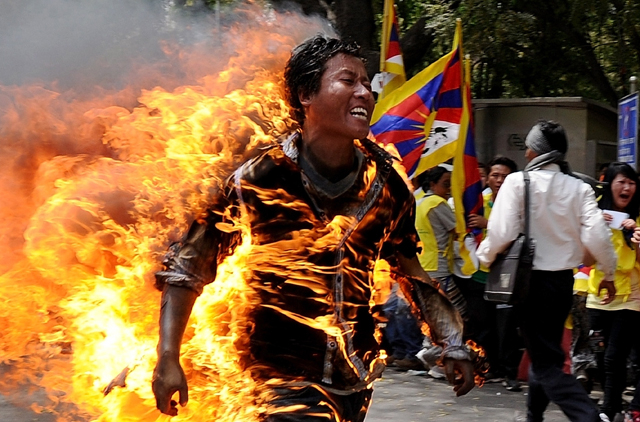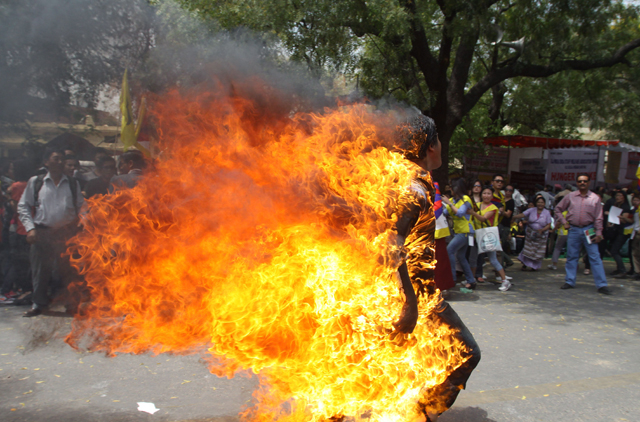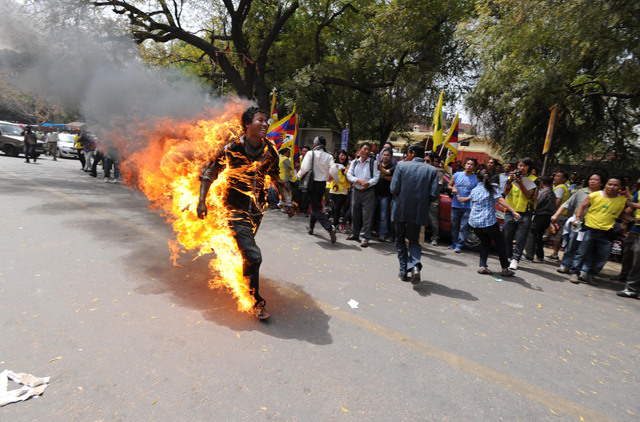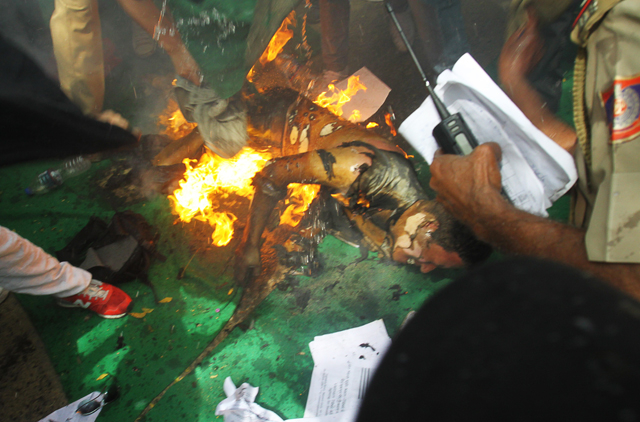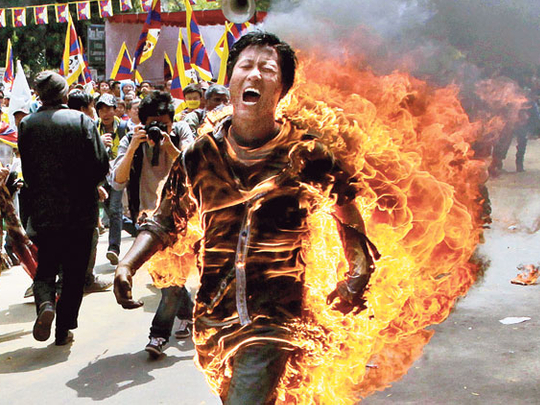
NEW DELHI: A Tibetan exile set himself on fire as he ran down a street in New Delhi on Monday, suffering life-threatening burns during a protest against a visit this week to India by Chinese President Hu Jintao.
The 27-year-old, identified by fellow protesters as Janphel Yeshi, carried out his attempted self-immolation in Jantar Mantar, a city centre venue for public rallies and demonstrations.
Yeshi, dressed in a cardigan and dark trousers, screamed as his body was covered in flames and he ran along the road with black smoke pouring from his hair, according to witnesses.
"Suddenly this guy came running along," Nyima Tashi, a 39-year-old Tibetan businessman based in Delhi, told AFP. "Then he fell down. We were all shocked.
"One of our supporters threw a coat on him to try to put out the flames and then the police took him away to hospital. He was heavily burned."
"I had seen him at other rallies," Tashi added. "We are against the Chinese domination of Tibet, the lack of human rights and religious freedom."
R.K. Doshi, a doctor on the emergency ward of Ram Manohar Lohia hospital, said medical staff were fighting to save Yeshi's life.
"His situation is very critical. His survival chances are small," he said.
The Dalai Lama, Tibet's spiritual leader who lives in exile in the Indian hill town of Dharamshala, expressed sadness on hearing about the incident, his spokesman Choekyapa Chhime said.
Since the start of 2011, a total of 29 Tibetans, many of them Buddhist monks and nuns, are reported to have set themselves on fire in Tibetan-inhabited areas of China to protest against Chinese rule.
Hu is due in Delhi to attend a summit on Thursday of the fast-developing BRICS nations - Brazil, Russia, India, China and South Africa.
A group of several hundred Tibetan protesters gathered near parliament, where they jostled with police and vowed to demonstrate during the summit.
"We want the other BRICS countries to take note of why so many people are dying in Tibet," said Tenzin Namgyal, 27. "We want to tell China, 'Tibet is not your country, get out.'"
Fellow activists said that Yeshi was an unemployed man who had been planning his protest for days and had arrived at the site carrying a hidden bottle of kerosene fuel which he used to douse himself.
"He had a plan and he was preparing for this but he did not reveal it to any of us," Palden Dakpa, a friend of Yeshi's, told AFP. "He said he was to stay at Jantar Mantar for three days to protest at the Chinese leader's visit."
Yeshi fled from China in 2005 and was living in the Tibetan exiles' colony of Majnu ka Tila in Delhi, friends said.
Many Tibetans in China complain of religious repression as well as a gradual erosion of their culture, which they blame on a growing influx of Han Chinese - the country's dominant ethnic group - in areas where they live.
But China rejects the accusations and accuses the Dalai Lama of inciting self-immolations in a bid to split Tibet from the rest of the nation.
The Dalai Lama's spokesman, speaking from Dharamshala, said the leader was "very sad to hear about these kinds of sacrifices. These are courageous acts but how much effect will it have?
"The root cause is the Chinese repression in Tibet... It is like a lockout as the military is present everywhere in Tibet."
"It's very, very unfortunate. We've always maintained a position of appealing to individuals not to resort to drastic actions," added Dicki Chhoyang, information secretary of the Tibetan government in exile, speaking from Dharamshala.
Monday's protest was the second attempted self-immolation in Delhi, where thousands of Tibetan exiles live. Another man suffered minor burns in November when he tried to set himself on fire outside the Chinese embassy.


